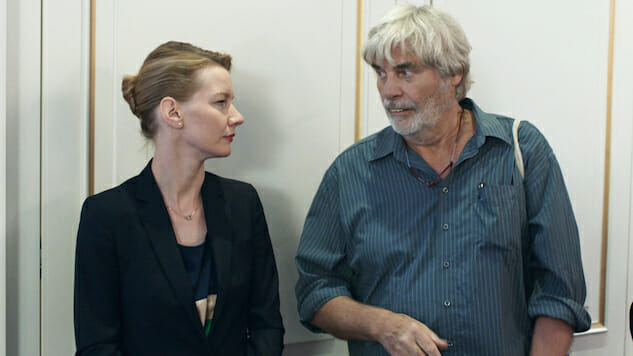Toni Erdmann’s Writer-Director and Stars Discuss Its Hairy Humor

Writer-director Maren Ade’s Toni Erdmann, an offbeat German comedy that was just nominated for an Oscar for Best Foreign Language Film, is difficult to pigeonhole. The film centers on a father, Winfried (Peter Simonischek), who assumes an alternate, prankster identity—the title one, for which he “disguises” himself with a set of fake teeth and a bad wig—while visiting his grown, international corporate consultant daughter, Ines (Sandra Hüller). She is having a slow-simmering crisis of her own, culminating in a naked birthday party, which her father, dressed as a tall, hairy beast, crashes. Practical jokers in films as in life are often barely disguised bullies, but throughout Toni Erdmann we see the father’s yearning for connection in every sideways glance he casts toward his exasperated daughter.
After a screening of the film at the New York Film Festival this past fall, Ade, Simonischek and Hüller discussed the film with the fest’s director, Kent Jones, as well as with the press. The following is edited for clarity and concision.
On the film’s central relationship
Maren Ade: It was father and daughter from the beginning, with him transforming into another character to meet her anew, to start from zero.
On Toni’s teeth
Ade: When I was a volunteer in Munich, there was the German premiere of the first Austin Powers. I worked there, and they gave us the fake teeth. I thought my father could use them, and he did like putting them in when he wanted to say something really serious.
On how many hours of rushes were shot for the film
Ade: 100.
Peter Simonischek: And we could make 10 other films of this 100 hours.
Ade: I could make another, different film. I could make another conflict.
Sandra Hüller: Maybe it’s dangerous to say, but when you’re tired and you’ve played everything possible, things happen. You [Ade] always talked about little gifts that you get from us that we couldn’t know at the beginning. So that’s why we were doing it over and over again.
On becoming a believable father and daughter
Hüller: We tried different things all the time. We had a long rehearsal process. When we started shooting we could get on each others’ nerves and fight.
-

-

-

-

-

-

-

-

-

-

-

-

-

-

-

-

-

-

-

-

-

-

-

-

-

-

-

-

-

-

-

-

-

-

-

-

-

-

-

-








































